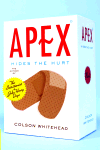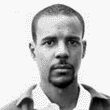- Categories:
What's in a Name: Colson Whitehead on Apex Hides the Hurt
 If it's true that the child who reads is father to the man who writes, one might well wonder: What sort of cutting-edge literary fare shaped the early sensibilities of novelist and MacArthur Fellowship-recipient Colson Whitehead, author of the April Book Sense Pick Apex Hides the Hurt (Doubleday)?
If it's true that the child who reads is father to the man who writes, one might well wonder: What sort of cutting-edge literary fare shaped the early sensibilities of novelist and MacArthur Fellowship-recipient Colson Whitehead, author of the April Book Sense Pick Apex Hides the Hurt (Doubleday)?
"Comics, and science fiction," was the 37-year-old New York author's somewhat surprising answer. "It just seemed, from the time I was 10 or 11, that writing could be a cool job -- you know, writing Spiderman or X-Men or something."
 Colson Whitehead |
But it wasn't long before future-novelist Whitehead discovered more mature literature. "In high school, Crime and Punishment I thought was a real eye-opener," he recalled with a chuckle. "And then in college I started reading more 20th-century authors -- people like Nathanael West and Thomas Pynchon and Ralph Ellison, who were very good models for me when I was trying to find my voice."
Indeed, a reader may discern conceptual echoes of those three writers (as well, perhaps, as such Marvel Comics masters as Frank Miller, John Byrne, and Chris Claremont) in Whitehead's fiction, where beleaguered or wounded individuals struggle to find meaningful personal identities in a slightly surreal and menacing world.
In Apex Hides the Hurt, for instance, the protagonist is a "nomenclature consultant" who makes his living giving names to corporate products ("Loquacia ... the new anti-shyness drug"), while he himself remains unnamed throughout the book. "He dealt in lies and promises, distilled them into syllables," the novel says of its main figure, who maneuvers in a world where the lines separating infomercials from popular culture from "real-life" often appear irreparably blurred.
Nonetheless, the realistic details of Whitehead's fiction seem firmly (if sometimes ironically) rooted in fact -- thanks, perhaps, to the years he spent (after a Harvard education) working for The Village Voice.
"It was a really fun time," the author said of his stint at that Manhattan weekly, where he joined the staff in 1991. "I met my wife there, made a lot of good friends there ... and it gave me some really good work habits. I was a big procrastinator, but if you want to keep your lights on, you have to hand in the piece on time. So I learned to work under deadline, and to be more focused."
Whitehead started at the Voice Literary Supplement and then began writing book and TV and music reviews. "After four or five years of doing that," he said, "I became confident to start writing fiction."
His first published novel was The Intuitionist (1999), which a San Francisco Chronicle reviewer called "magical" and compared to Catch-22 and The Bluest Eye. The book's publication validated the author's leap into fiction, even if it failed to completely reassure his practical-minded parents.
"They're both business people," Whitehead said, "so when I first started working at The Voice, they were a little alarmed at the annual income of a freelance writer.
"When Anchor Books bought The Intuitionist, I called my mom and was very excited; she's like, 'Well don't quit your day job.' I'm like, 'I'm published! I have a little money, I can work on something else.' They just didn't understand how it sort of worked."
Whitehead had, in fact, already quit his then-day job (at a computer company). "I had paid back all the debts I had incurred while writing The Intuitionist," he explained. "So I figured I would go back to freelancing and start another book. I'd actually quit about a week before I found out that the book was being published, so I guess there was something in the air."
That something led to his second novel, John Henry Days, which was published in 2001 and was named an Editors' Choice by the New York Times Book Review ("A voice so intelligent and an idiom so imaginative that it can lift the reader right out of his chair").
In 2002, the author received his MacArthur Fellowship (the so-called "genius grant"), a highly singular career-choice validation.
Apex Hides the Hurt was begun not long after publication of John Henry Days, Whitehead said, and was inspired in part by a nonfiction piece he'd read years earlier. "In 1997 or maybe '96, the New York Times Magazine had an article about the naming of Prozac; and it talked to a bunch of pharmaceutical namers. At the time, I thought, 'Oh, that's such a weird sort of industry.' And I put that thought away, to work on it sometime.
"Then I got thinking about -- I was writing about cities a lot -- I was thinking about zoning regulations, and how streets are named, and how we decide what's a business zone and what's a residential zone. One day, I can't remember exactly how it happened, but I sort of merged the two ideas and was talking about naming as power, and how we sort of control our environment by naming or renaming things."
Whitehead was at that time also writing "these sort of weird little essays about New York." After September 11, he put his novel-manuscript aside to write more such pieces, enough for a book: The Colossus of New York (2003), hailed by the New York Times as "a tour de force" and described by a Kirkus reviewer as being "as ebullient as Walt Whitman and as succinct as Emily Dickinson."
The author then returned to his novel-in-progress, which was making its way from an abstract concept ("Isn't corporate naming interesting?") to a story about a man helping a small American city come to terms with some hard truths about its history.
"I think," said the author, "I just wanted to explore a lot of different aspects of naming. There's naming in the business world: the world of branding. There's the influence of personal names: who we are, how we think of ourselves. And there's the importance of names in history. I mean, the victors get to name the towns after themselves....
"The work comes in getting a character in a story to talk about these different things -- and in making the characters real, not just sort of mouthpieces for ideas. So I start off very sort of high-above, and then I kind of zoom in and try to figure out what the world looks like."
Whitehead will be touring in support of Apex Hides the Hurt in late April, traveling to the West Coast, Oregon, Iowa, and Washington, D.C., visiting mostly independent stores.
"It wasn't until I got to college that I discovered the world of independent bookstores," he remembered, "and the way that people who work there really love books. Being published now, I get to meet them and talk to them, and see how great an affection they have for writing and for their customers.... They're wonderful."
If he brings something to read on his tour, Whitehead guessed it will be something by his latest "big discovery" -- Philip Roth.
But Colson Whitehead has not forgotten his comic-book roots. "I still pick up a Frank Miller volume, now and again." --Tom Nolan

